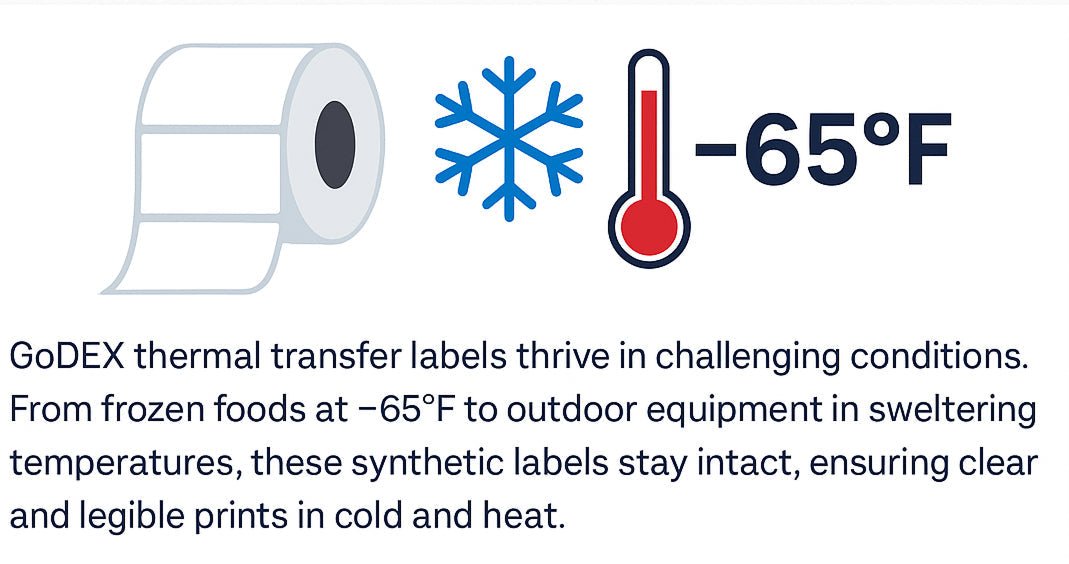When your labels face freezing cold, heat, or outdoor exposure, standard paper rolls simply don’t hold up.
For environments like cold storage facilities, food packaging, laboratories, and outdoor logistics, you need thermal transfer synthetic labels designed to last.
At McAuley Labels, we specialize in waterproof and temperature-resistant thermal labels that maintain clarity and adhesion no matter the conditions.
🧱 1. The Challenge of Extreme Temperature Labeling
Extreme conditions can cause:
-
Paper labels to crack, curl, or peel in cold storage
-
Ink to fade or smudge in heat or humidity
-
Adhesive to lose tack on metal, glass, or plastic surfaces
That’s why synthetic polyester and polypropylene labels, a form of synthetic paper engineered for durability and heat resistance, have become the go-to solution for industries where performance matters more than price.
These advanced materials resist tearing, moisture, and temperature shifts, making them ideal for labeling in cold storage, outdoor operations, and heavy-duty environments.
❄️ 2. Best Labels for Cold and Freezer Storage
Cold storage labeling demands flexibility and durability at temperatures as low as -40°F (-40°C).
McAuley’s GoDEX Synthetic Polyester Labels maintain adhesion and barcode readability even when applied to frozen or frosted surfaces.
Recommended Features:
-
Waterproof and oil-resistant coating
-
Freezer-grade adhesive that bonds to metal or plastic
-
Resin ribbon compatibility for permanent, fade-proof text
🧪 Perfect for:
-
Food processing and packaging
-
Laboratory sample storage
-
Pharmaceutical cold chain labeling
👉 GoDEX Synthetic Labels – Waterproof & Durable Polyester
☀️ 3. Best Labels for Outdoor and Industrial Use
Outdoor conditions expose labels to UV rays, rain, and temperature swings that quickly degrade standard materials.
Polyester and polypropylene thermal transfer labels resist sunlight, chemicals, and abrasion, making them ideal for construction, asset tracking, and shipping containers.
Key Benefits:
-
Fade-resistant under UV exposure
-
Weatherproof and chemical-resistant
-
High-contrast printing for barcodes and compliance tags
Used in:
-
Manufacturing and equipment labeling
-
Logistics and shipping
-
Power utilities and outdoor signage
🔧 4. Why Use Thermal Transfer Instead of Direct Thermal?
Direct thermal labels are convenient but not built for extreme environments — heat exposure can darken the label and make barcodes unreadable.
Thermal transfer printing, on the other hand:
-
Uses a ribbon (wax, resin, or mixed)
-
Creates a permanent, durable image
-
Works on synthetic materials like polyester and polypropylene
🧠 Tip: For maximum resistance, use resin ribbons with polyester labels.
🧩 5. Printer Compatibility
All GoDEX thermal transfer printers support high-durability label materials:
👉 See the full range: Thermal Transfer Printers
📦 6. Storage and Handling Tips
To extend label life before use:
-
Store rolls between 60°F – 77°F (15°C – 25°C)
-
Keep in a dry environment away from direct sunlight
-
Avoid stacking heavy rolls to prevent curling
🧠 7. Why Choose McAuley Labels
McAuley Labels offers premium GoDEX-compatible synthetic label rolls made for demanding environments.
All labels feature:
-
✅ Industrial-grade adhesive formulations
-
✅ Waterproof and oil-resistant coating
-
✅ Free shipping across the U.S.
-
✅ Tested compatibility with GoDEX printers

🏁 Conclusion
When labels need to perform under pressure, from freezing warehouses to sun-baked shipping yards, only thermal transfer synthetic labels deliver lasting results.
McAuley’s durable polyester and polypropylene labels ensure your data, barcodes, and branding stay readable for years.
👉 Explore the full collection here: Thermal Labels for Harsh Environments

